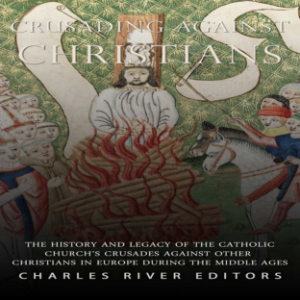

Crusading against Christians: The History and Legacy of the Catholic Church’s Crusades against Other Christians during the Middle Ages
Charles River Editors
After the fall of the Western Roman Empire in the 5th century, when Western Europe was governed by a Germanic warrior-caste, the theory of a just and virtuous war took root. The Roman Church enhanced its authority by sanctifying oaths taken for just military purposes, and Bishop Anselm of Lucca (d. 1086) was the first to suggest that military action for the cause of religion could remit sin. At the Council of Clermont in July 1095, Pope Urban II canonized religious war by urging Western Europe's nobility to take up arms in defense of the Byzantine Empire against the Muslims, thus launching the Crusades. Religious military orders such as the Knights of Saint John, the Templars, and the Hospitallers arose, ostensibly founded to protect the weak and the sick but also to extend the boundaries of Christianity and the power of the Church. In Europe, the knight, originally a mounted warrior, became a consecrated soldier of Christ, dedicated to the defense of the Church by solemn vows made before an altar.
Naturally, the question remained concerning the use of arms against other Christians. Eastern Christians did not acknowledge the Pope's supremacy, and many held that it was lawful for him to declare a crusade to bring schismatics back to the obedience of Rome. German knights fighting the Orthodox Russians at the Battle on the Ice in 1242 believed this, as did the Hungarian prosecutors of the 1235 invasion of Bosnia, which was thinly disguised as a crusade. The Church even extended the object of crusade to believers in communion with Rome, who refused to obey lawful authority. After peasants revolted against the Prince-Archbishop of Bremen in 1204 over tithes and land rights, Pope Gregory IX was persuaded to declare them heretics and proclaim a crusade against them.
Duration - 5h 43m.
Author - Charles River Editors.
Narrator - Bill Caufield.
Published Date - Friday, 06 January 2023.
Copyright - © 2021 Charles River Editors ©.
Location:
United States
Description:
After the fall of the Western Roman Empire in the 5th century, when Western Europe was governed by a Germanic warrior-caste, the theory of a just and virtuous war took root. The Roman Church enhanced its authority by sanctifying oaths taken for just military purposes, and Bishop Anselm of Lucca (d. 1086) was the first to suggest that military action for the cause of religion could remit sin. At the Council of Clermont in July 1095, Pope Urban II canonized religious war by urging Western Europe's nobility to take up arms in defense of the Byzantine Empire against the Muslims, thus launching the Crusades. Religious military orders such as the Knights of Saint John, the Templars, and the Hospitallers arose, ostensibly founded to protect the weak and the sick but also to extend the boundaries of Christianity and the power of the Church. In Europe, the knight, originally a mounted warrior, became a consecrated soldier of Christ, dedicated to the defense of the Church by solemn vows made before an altar. Naturally, the question remained concerning the use of arms against other Christians. Eastern Christians did not acknowledge the Pope's supremacy, and many held that it was lawful for him to declare a crusade to bring schismatics back to the obedience of Rome. German knights fighting the Orthodox Russians at the Battle on the Ice in 1242 believed this, as did the Hungarian prosecutors of the 1235 invasion of Bosnia, which was thinly disguised as a crusade. The Church even extended the object of crusade to believers in communion with Rome, who refused to obey lawful authority. After peasants revolted against the Prince-Archbishop of Bremen in 1204 over tithes and land rights, Pope Gregory IX was persuaded to declare them heretics and proclaim a crusade against them. Duration - 5h 43m. Author - Charles River Editors. Narrator - Bill Caufield. Published Date - Friday, 06 January 2023. Copyright - © 2021 Charles River Editors ©.
Language:
English
Opening Credits
Duración:00:00:12
Introduction
Duración:00:11:09
The crusades and the birth of knighthood
Duración:00:23:20
Teutonic beginnings
Duración:00:16:20
Von salza and the state of the teutonic order
Duración:00:12:13
The origins of the livonian brothers
Duración:00:16:19
The livonian brothers' wars
Duración:00:21:05
Behind the iron cross
Duración:00:11:10
The fall from grace
Duración:00:20:50
The cathars
Duración:00:47:06
Southern france at the beginning of the 13th century
Duración:00:10:09
The albigensian crusade
Duración:00:24:38
The aftermath of the albigensian crusade
Duración:00:05:42
A new reform movement
Duración:00:46:36
Martyrdom
Duración:00:17:42
The anti hussite crusade
Duración:00:13:34
The council of basel
Duración:00:18:52
The last hussite wars
Duración:00:14:16
The legacy of the conflicts
Duración:00:12:26
Ending Credits
Duración:00:00:12